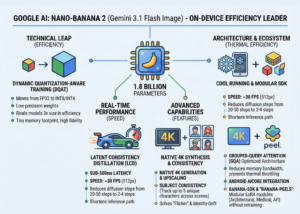Google’s open MedGemma AI models could transform healthcare

Instead of keeping their new MedGemma AI models locked behind expensive APIs, Google will hand these powerful tools to healthcare developers.
The new arrivals are called MedGemma 27B Multimodal and MedSigLIP and they’re part of Google’s growing collection of open-source healthcare AI models. What makes these special isn’t just their technical prowess, but the fact that hospitals, researchers, and developers can download them, modify them, and run them however they see fit.
Google’s AI meets real healthcare
The flagship MedGemma 27B model doesn’t just read medical text like previous versions did; it can actually “look” at medical images and understand what it’s seeing. Whether it’s chest X-rays, pathology slides, or patient records potentially spanning months or years, it can process all of this information together, much like a doctor would.
The performance figures are quite impressive. When tested on MedQA, a standard medical knowledge benchmark, the 27B text model scored 87.7%. That puts it within spitting distance of much larger, more expensive models whilst costing about a tenth as much to run. For cash-strapped healthcare systems, that’s potentially transformative.
The smaller sibling, MedGemma 4B, might be more modest in size but it’s no slouch. Despite being tiny by modern AI standards, it scored 64.4% on the same tests, making it one of the best performers in its weight class. More importantly, when US board-certified radiologists reviewed chest X-ray reports it had written, they deemed 81% accurate enough to guide actual patient care.
MedSigLIP: A featherweight powerhouse
Alongside these generative AI models, Google has released MedSigLIP. At just 400 million parameters, it’s practically featherweight compared to today’s AI giants, but it’s been specifically trained to understand medical images in ways that general-purpose models cannot.
This little powerhouse has been fed a diet of chest X-rays, tissue samples, skin condition photos, and eye scans. The result? It can spot patterns and features that matter in medical contexts whilst still handling everyday images perfectly well.
MedSigLIP creates a bridge between images and text. Show it a chest X-ray, and ask it to find similar cases in a database, and it’ll understand not just visual similarities but medical significance too.
Healthcare professionals are putting Google’s AI models to work
The proof of any AI tool lies in whether real professionals actually want to use it. Early reports suggest doctors and healthcare companies are excited about what these models can do.
DeepHealth in Massachusetts has been testing MedSigLIP for chest X-ray analysis. They’re finding it helps spot potential problems that might otherwise be missed, acting as a safety net for overworked radiologists. Meanwhile, at Chang Gung Memorial Hospital in Taiwan, researchers have discovered that MedGemma works with traditional Chinese medical texts and answers staff questions with high accuracy.
Tap Health in India has highlighted something crucial about MedGemma’s reliability. Unlike general-purpose AI that might hallucinate medical facts, MedGemma seems to understand when clinical context matters. It’s the difference between a chatbot that sounds medical and one that actually thinks medically.
Why open-sourcing the AI models is critical in healthcare
Beyond generosity, Google’s decision to make these models is also strategic. Healthcare has unique requirements that standard AI services can’t always meet. Hospitals need to know their patient data isn’t leaving their premises. Research institutions need models that won’t suddenly change behaviour without warning. Developers need the freedom to fine-tune for very specific medical tasks.
By open-sourcing the AI models, Google has addressed these concerns with healthcare deployments. A hospital can run MedGemma on their own servers, modify it for their specific needs, and trust that it’ll behave consistently over time. For medical applications where reproducibility is crucial, this stability is invaluable.
However, Google has been careful to emphasise that these models aren’t ready to replace doctors. They’re tools that require human oversight, clinical correlation, and proper validation before any real-world deployment. The outputs need checking, the recommendations need verifying, and the decisions still rest with qualified medical professionals.
This cautious approach makes sense. Even with impressive benchmark scores, medical AI can still make mistakes, particularly when dealing with unusual cases or edge scenarios. The models excel at processing information and spotting patterns, but they can’t replace the judgment, experience, and ethical responsibility that human doctors bring.
What’s exciting about this release isn’t just the immediate capabilities, but what it enables. Smaller hospitals that couldn’t afford expensive AI services can now access cutting-edge technology. Researchers in developing countries can build specialised tools for local health challenges. Medical schools can teach students using AI that actually understands medicine.
The models are designed to run on single graphics cards, with the smaller versions even adaptable for mobile devices. This accessibility opens doors for point-of-care AI applications in places where high-end computing infrastructure simply doesn’t exist.
As healthcare continues grappling with staff shortages, increasing patient loads, and the need for more efficient workflows, AI tools like Google’s MedGemma could provide some much-needed relief. Not by replacing human expertise, but by amplifying it and making it more accessible where it’s needed most.
(Photo by Owen Beard)
See also: Tencent improves testing creative AI models with new benchmark
Want to learn more about AI and big data from industry leaders? Check out AI & Big Data Expo taking place in Amsterdam, California, and London. The comprehensive event is co-located with other leading events including Intelligent Automation Conference, BlockX, Digital Transformation Week, and Cyber Security & Cloud Expo.
Explore other upcoming enterprise technology events and webinars powered by TechForge here.












